Organizational Behavior: Analysis of Motivation and Culture at Tesco
VerifiedAdded on 2024/05/31
|28
|6066
|423
Report
AI Summary
This report provides a detailed analysis of organizational behavior concepts within Tesco Plc, examining the influence of organizational culture, politics, and power on individual and team performance. It evaluates content and process theories of motivation, such as Maslow's hierarchy of needs, Herzberg's two-factor theory, and Vroom's expectancy theory, and their application in achieving organizational goals. The report also explores the factors that contribute to effective team development and analyzes team development theories for fostering dynamic cooperation. Finally, it applies and justifies organizational behavior concepts and philosophies within Tesco, considering a given business situation to provide a comprehensive understanding of organizational dynamics within the company. Desklib provides similar solved assignments and past papers for students.

ORGANIZATIONAL BEHAVIOR
Paraphrase This Document
Need a fresh take? Get an instant paraphrase of this document with our AI Paraphraser
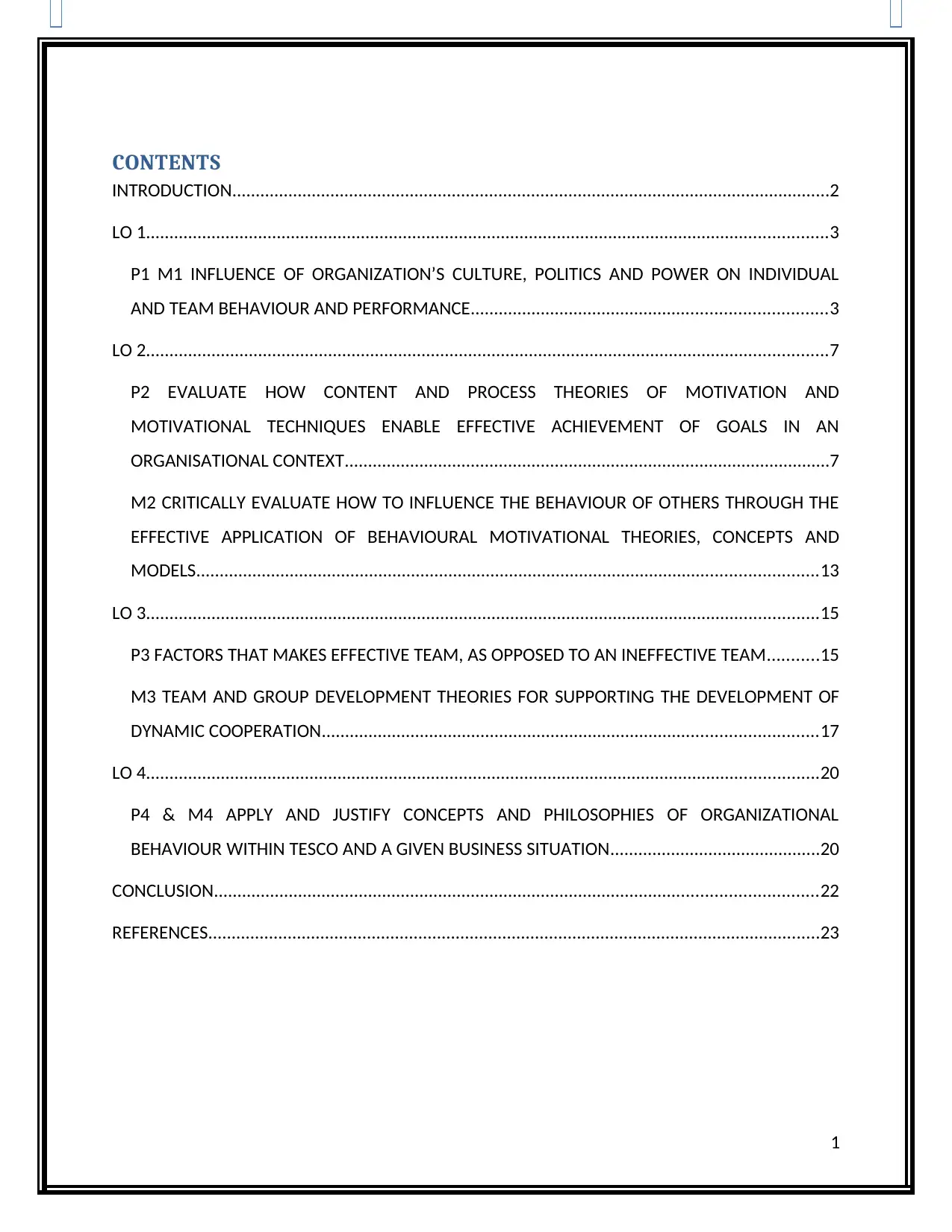
CONTENTS
INTRODUCTION................................................................................................................................2
LO 1..................................................................................................................................................3
P1 M1 INFLUENCE OF ORGANIZATION’S CULTURE, POLITICS AND POWER ON INDIVIDUAL
AND TEAM BEHAVIOUR AND PERFORMANCE............................................................................3
LO 2..................................................................................................................................................7
P2 EVALUATE HOW CONTENT AND PROCESS THEORIES OF MOTIVATION AND
MOTIVATIONAL TECHNIQUES ENABLE EFFECTIVE ACHIEVEMENT OF GOALS IN AN
ORGANISATIONAL CONTEXT........................................................................................................7
M2 CRITICALLY EVALUATE HOW TO INFLUENCE THE BEHAVIOUR OF OTHERS THROUGH THE
EFFECTIVE APPLICATION OF BEHAVIOURAL MOTIVATIONAL THEORIES, CONCEPTS AND
MODELS.....................................................................................................................................13
LO 3................................................................................................................................................15
P3 FACTORS THAT MAKES EFFECTIVE TEAM, AS OPPOSED TO AN INEFFECTIVE TEAM...........15
M3 TEAM AND GROUP DEVELOPMENT THEORIES FOR SUPPORTING THE DEVELOPMENT OF
DYNAMIC COOPERATION..........................................................................................................17
LO 4................................................................................................................................................20
P4 & M4 APPLY AND JUSTIFY CONCEPTS AND PHILOSOPHIES OF ORGANIZATIONAL
BEHAVIOUR WITHIN TESCO AND A GIVEN BUSINESS SITUATION.............................................20
CONCLUSION.................................................................................................................................22
REFERENCES...................................................................................................................................23
1
INTRODUCTION................................................................................................................................2
LO 1..................................................................................................................................................3
P1 M1 INFLUENCE OF ORGANIZATION’S CULTURE, POLITICS AND POWER ON INDIVIDUAL
AND TEAM BEHAVIOUR AND PERFORMANCE............................................................................3
LO 2..................................................................................................................................................7
P2 EVALUATE HOW CONTENT AND PROCESS THEORIES OF MOTIVATION AND
MOTIVATIONAL TECHNIQUES ENABLE EFFECTIVE ACHIEVEMENT OF GOALS IN AN
ORGANISATIONAL CONTEXT........................................................................................................7
M2 CRITICALLY EVALUATE HOW TO INFLUENCE THE BEHAVIOUR OF OTHERS THROUGH THE
EFFECTIVE APPLICATION OF BEHAVIOURAL MOTIVATIONAL THEORIES, CONCEPTS AND
MODELS.....................................................................................................................................13
LO 3................................................................................................................................................15
P3 FACTORS THAT MAKES EFFECTIVE TEAM, AS OPPOSED TO AN INEFFECTIVE TEAM...........15
M3 TEAM AND GROUP DEVELOPMENT THEORIES FOR SUPPORTING THE DEVELOPMENT OF
DYNAMIC COOPERATION..........................................................................................................17
LO 4................................................................................................................................................20
P4 & M4 APPLY AND JUSTIFY CONCEPTS AND PHILOSOPHIES OF ORGANIZATIONAL
BEHAVIOUR WITHIN TESCO AND A GIVEN BUSINESS SITUATION.............................................20
CONCLUSION.................................................................................................................................22
REFERENCES...................................................................................................................................23
1
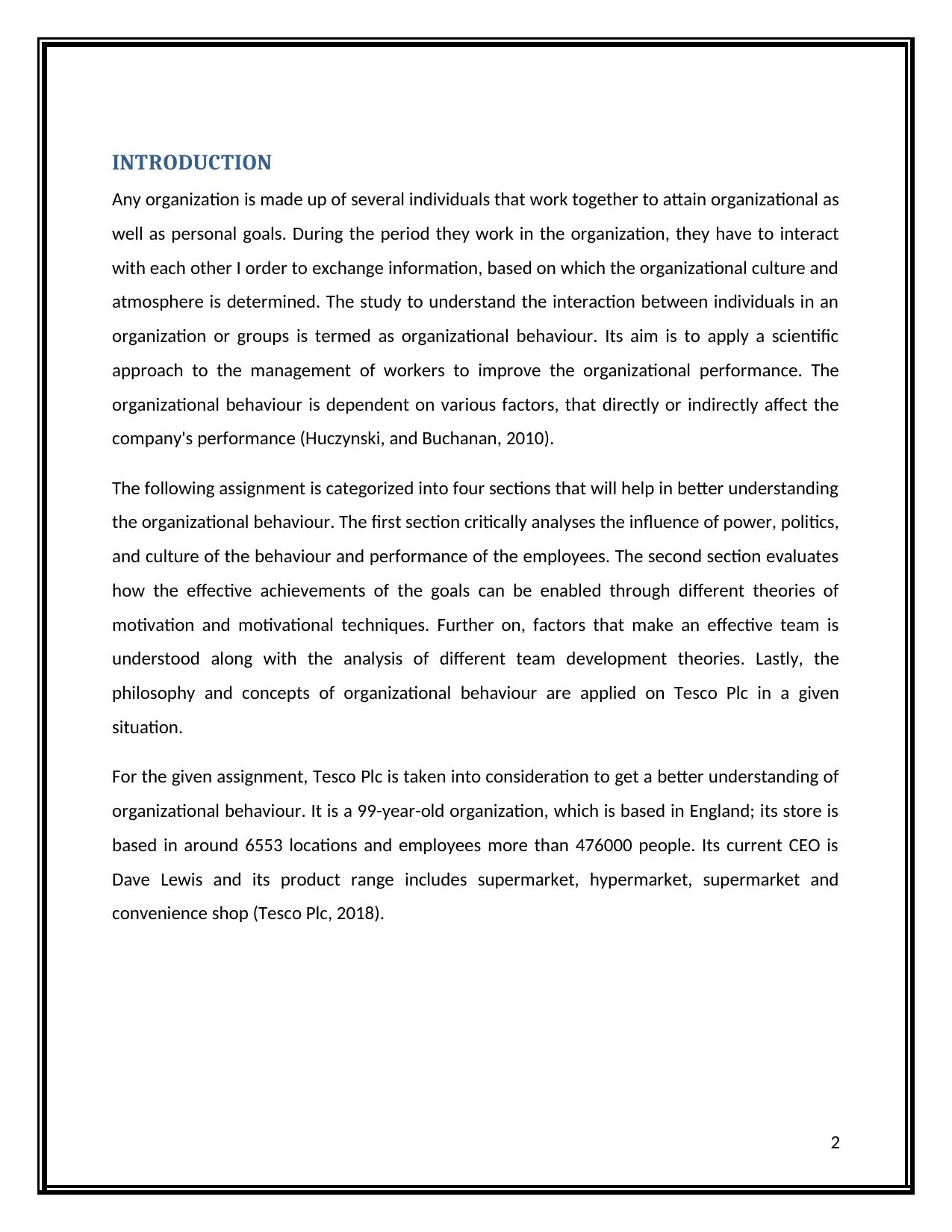
INTRODUCTION
Any organization is made up of several individuals that work together to attain organizational as
well as personal goals. During the period they work in the organization, they have to interact
with each other I order to exchange information, based on which the organizational culture and
atmosphere is determined. The study to understand the interaction between individuals in an
organization or groups is termed as organizational behaviour. Its aim is to apply a scientific
approach to the management of workers to improve the organizational performance. The
organizational behaviour is dependent on various factors, that directly or indirectly affect the
company's performance (Huczynski, and Buchanan, 2010).
The following assignment is categorized into four sections that will help in better understanding
the organizational behaviour. The first section critically analyses the influence of power, politics,
and culture of the behaviour and performance of the employees. The second section evaluates
how the effective achievements of the goals can be enabled through different theories of
motivation and motivational techniques. Further on, factors that make an effective team is
understood along with the analysis of different team development theories. Lastly, the
philosophy and concepts of organizational behaviour are applied on Tesco Plc in a given
situation.
For the given assignment, Tesco Plc is taken into consideration to get a better understanding of
organizational behaviour. It is a 99-year-old organization, which is based in England; its store is
based in around 6553 locations and employees more than 476000 people. Its current CEO is
Dave Lewis and its product range includes supermarket, hypermarket, supermarket and
convenience shop (Tesco Plc, 2018).
2
Any organization is made up of several individuals that work together to attain organizational as
well as personal goals. During the period they work in the organization, they have to interact
with each other I order to exchange information, based on which the organizational culture and
atmosphere is determined. The study to understand the interaction between individuals in an
organization or groups is termed as organizational behaviour. Its aim is to apply a scientific
approach to the management of workers to improve the organizational performance. The
organizational behaviour is dependent on various factors, that directly or indirectly affect the
company's performance (Huczynski, and Buchanan, 2010).
The following assignment is categorized into four sections that will help in better understanding
the organizational behaviour. The first section critically analyses the influence of power, politics,
and culture of the behaviour and performance of the employees. The second section evaluates
how the effective achievements of the goals can be enabled through different theories of
motivation and motivational techniques. Further on, factors that make an effective team is
understood along with the analysis of different team development theories. Lastly, the
philosophy and concepts of organizational behaviour are applied on Tesco Plc in a given
situation.
For the given assignment, Tesco Plc is taken into consideration to get a better understanding of
organizational behaviour. It is a 99-year-old organization, which is based in England; its store is
based in around 6553 locations and employees more than 476000 people. Its current CEO is
Dave Lewis and its product range includes supermarket, hypermarket, supermarket and
convenience shop (Tesco Plc, 2018).
2
⊘ This is a preview!⊘
Do you want full access?
Subscribe today to unlock all pages.

Trusted by 1+ million students worldwide
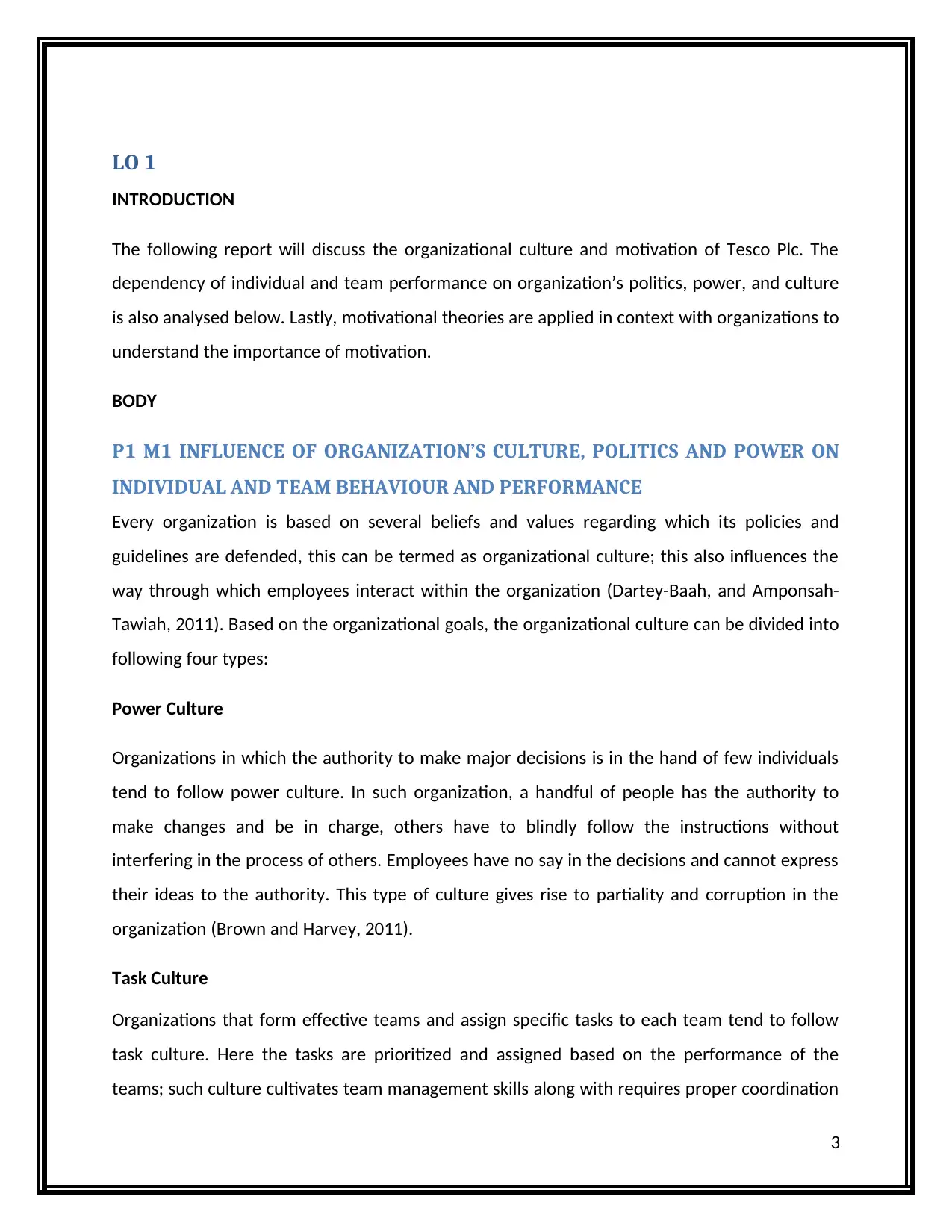
LO 1
INTRODUCTION
The following report will discuss the organizational culture and motivation of Tesco Plc. The
dependency of individual and team performance on organization’s politics, power, and culture
is also analysed below. Lastly, motivational theories are applied in context with organizations to
understand the importance of motivation.
BODY
P1 M1 INFLUENCE OF ORGANIZATION’S CULTURE, POLITICS AND POWER ON
INDIVIDUAL AND TEAM BEHAVIOUR AND PERFORMANCE
Every organization is based on several beliefs and values regarding which its policies and
guidelines are defended, this can be termed as organizational culture; this also influences the
way through which employees interact within the organization (Dartey-Baah, and Amponsah-
Tawiah, 2011). Based on the organizational goals, the organizational culture can be divided into
following four types:
Power Culture
Organizations in which the authority to make major decisions is in the hand of few individuals
tend to follow power culture. In such organization, a handful of people has the authority to
make changes and be in charge, others have to blindly follow the instructions without
interfering in the process of others. Employees have no say in the decisions and cannot express
their ideas to the authority. This type of culture gives rise to partiality and corruption in the
organization (Brown and Harvey, 2011).
Task Culture
Organizations that form effective teams and assign specific tasks to each team tend to follow
task culture. Here the tasks are prioritized and assigned based on the performance of the
teams; such culture cultivates team management skills along with requires proper coordination
3
INTRODUCTION
The following report will discuss the organizational culture and motivation of Tesco Plc. The
dependency of individual and team performance on organization’s politics, power, and culture
is also analysed below. Lastly, motivational theories are applied in context with organizations to
understand the importance of motivation.
BODY
P1 M1 INFLUENCE OF ORGANIZATION’S CULTURE, POLITICS AND POWER ON
INDIVIDUAL AND TEAM BEHAVIOUR AND PERFORMANCE
Every organization is based on several beliefs and values regarding which its policies and
guidelines are defended, this can be termed as organizational culture; this also influences the
way through which employees interact within the organization (Dartey-Baah, and Amponsah-
Tawiah, 2011). Based on the organizational goals, the organizational culture can be divided into
following four types:
Power Culture
Organizations in which the authority to make major decisions is in the hand of few individuals
tend to follow power culture. In such organization, a handful of people has the authority to
make changes and be in charge, others have to blindly follow the instructions without
interfering in the process of others. Employees have no say in the decisions and cannot express
their ideas to the authority. This type of culture gives rise to partiality and corruption in the
organization (Brown and Harvey, 2011).
Task Culture
Organizations that form effective teams and assign specific tasks to each team tend to follow
task culture. Here the tasks are prioritized and assigned based on the performance of the
teams; such culture cultivates team management skills along with requires proper coordination
3
Paraphrase This Document
Need a fresh take? Get an instant paraphrase of this document with our AI Paraphraser
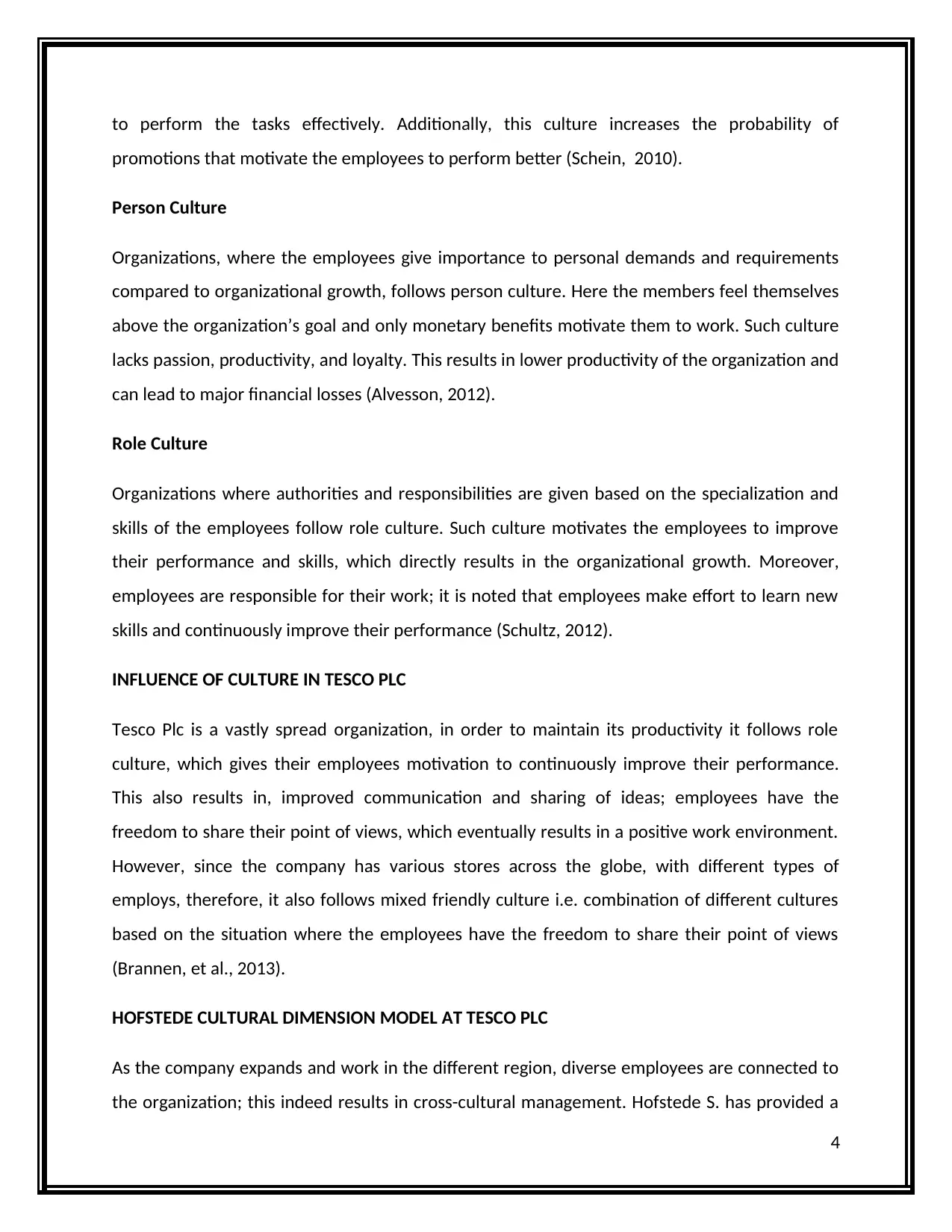
to perform the tasks effectively. Additionally, this culture increases the probability of
promotions that motivate the employees to perform better (Schein, 2010).
Person Culture
Organizations, where the employees give importance to personal demands and requirements
compared to organizational growth, follows person culture. Here the members feel themselves
above the organization’s goal and only monetary benefits motivate them to work. Such culture
lacks passion, productivity, and loyalty. This results in lower productivity of the organization and
can lead to major financial losses (Alvesson, 2012).
Role Culture
Organizations where authorities and responsibilities are given based on the specialization and
skills of the employees follow role culture. Such culture motivates the employees to improve
their performance and skills, which directly results in the organizational growth. Moreover,
employees are responsible for their work; it is noted that employees make effort to learn new
skills and continuously improve their performance (Schultz, 2012).
INFLUENCE OF CULTURE IN TESCO PLC
Tesco Plc is a vastly spread organization, in order to maintain its productivity it follows role
culture, which gives their employees motivation to continuously improve their performance.
This also results in, improved communication and sharing of ideas; employees have the
freedom to share their point of views, which eventually results in a positive work environment.
However, since the company has various stores across the globe, with different types of
employs, therefore, it also follows mixed friendly culture i.e. combination of different cultures
based on the situation where the employees have the freedom to share their point of views
(Brannen, et al., 2013).
HOFSTEDE CULTURAL DIMENSION MODEL AT TESCO PLC
As the company expands and work in the different region, diverse employees are connected to
the organization; this indeed results in cross-cultural management. Hofstede S. has provided a
4
promotions that motivate the employees to perform better (Schein, 2010).
Person Culture
Organizations, where the employees give importance to personal demands and requirements
compared to organizational growth, follows person culture. Here the members feel themselves
above the organization’s goal and only monetary benefits motivate them to work. Such culture
lacks passion, productivity, and loyalty. This results in lower productivity of the organization and
can lead to major financial losses (Alvesson, 2012).
Role Culture
Organizations where authorities and responsibilities are given based on the specialization and
skills of the employees follow role culture. Such culture motivates the employees to improve
their performance and skills, which directly results in the organizational growth. Moreover,
employees are responsible for their work; it is noted that employees make effort to learn new
skills and continuously improve their performance (Schultz, 2012).
INFLUENCE OF CULTURE IN TESCO PLC
Tesco Plc is a vastly spread organization, in order to maintain its productivity it follows role
culture, which gives their employees motivation to continuously improve their performance.
This also results in, improved communication and sharing of ideas; employees have the
freedom to share their point of views, which eventually results in a positive work environment.
However, since the company has various stores across the globe, with different types of
employs, therefore, it also follows mixed friendly culture i.e. combination of different cultures
based on the situation where the employees have the freedom to share their point of views
(Brannen, et al., 2013).
HOFSTEDE CULTURAL DIMENSION MODEL AT TESCO PLC
As the company expands and work in the different region, diverse employees are connected to
the organization; this indeed results in cross-cultural management. Hofstede S. has provided a
4
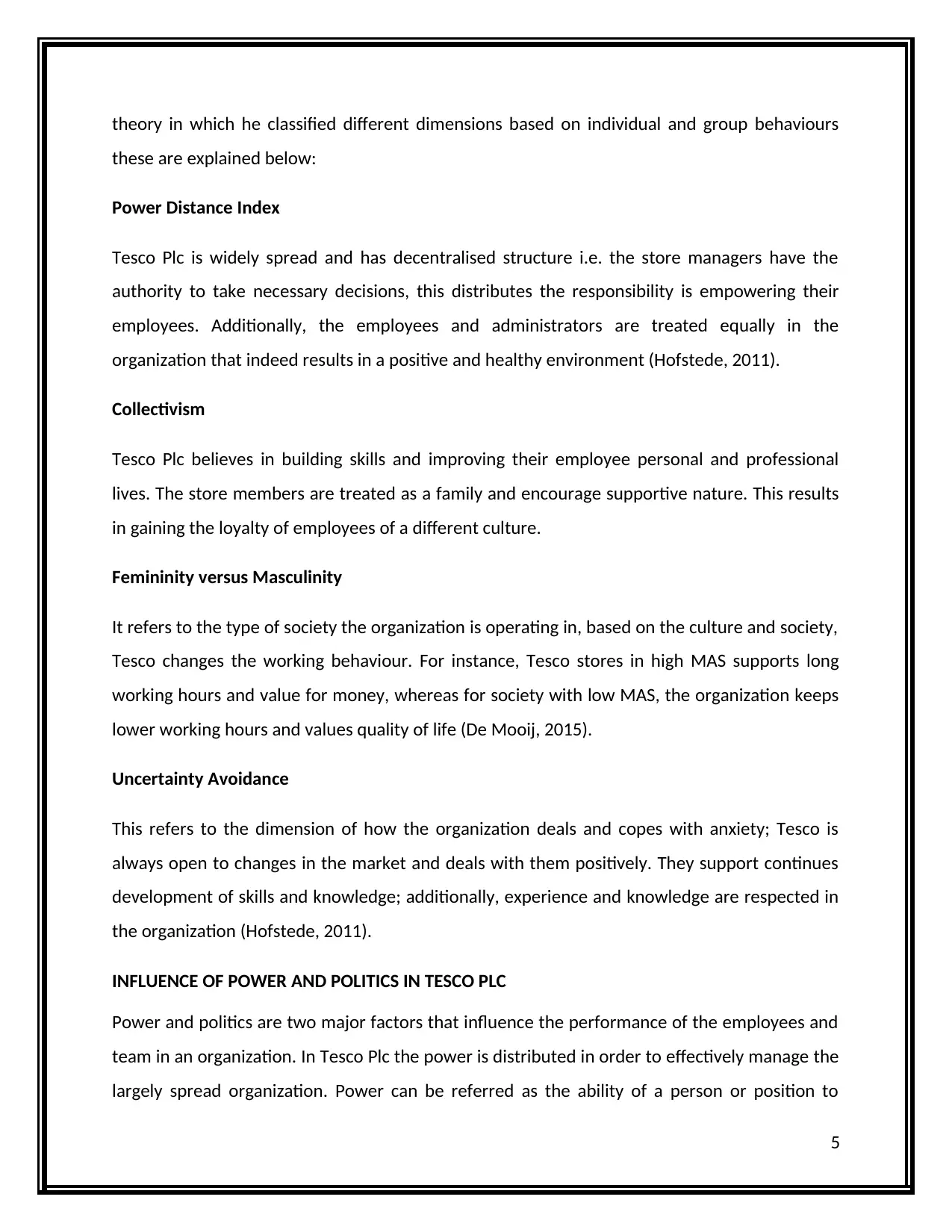
theory in which he classified different dimensions based on individual and group behaviours
these are explained below:
Power Distance Index
Tesco Plc is widely spread and has decentralised structure i.e. the store managers have the
authority to take necessary decisions, this distributes the responsibility is empowering their
employees. Additionally, the employees and administrators are treated equally in the
organization that indeed results in a positive and healthy environment (Hofstede, 2011).
Collectivism
Tesco Plc believes in building skills and improving their employee personal and professional
lives. The store members are treated as a family and encourage supportive nature. This results
in gaining the loyalty of employees of a different culture.
Femininity versus Masculinity
It refers to the type of society the organization is operating in, based on the culture and society,
Tesco changes the working behaviour. For instance, Tesco stores in high MAS supports long
working hours and value for money, whereas for society with low MAS, the organization keeps
lower working hours and values quality of life (De Mooij, 2015).
Uncertainty Avoidance
This refers to the dimension of how the organization deals and copes with anxiety; Tesco is
always open to changes in the market and deals with them positively. They support continues
development of skills and knowledge; additionally, experience and knowledge are respected in
the organization (Hofstede, 2011).
INFLUENCE OF POWER AND POLITICS IN TESCO PLC
Power and politics are two major factors that influence the performance of the employees and
team in an organization. In Tesco Plc the power is distributed in order to effectively manage the
largely spread organization. Power can be referred as the ability of a person or position to
5
these are explained below:
Power Distance Index
Tesco Plc is widely spread and has decentralised structure i.e. the store managers have the
authority to take necessary decisions, this distributes the responsibility is empowering their
employees. Additionally, the employees and administrators are treated equally in the
organization that indeed results in a positive and healthy environment (Hofstede, 2011).
Collectivism
Tesco Plc believes in building skills and improving their employee personal and professional
lives. The store members are treated as a family and encourage supportive nature. This results
in gaining the loyalty of employees of a different culture.
Femininity versus Masculinity
It refers to the type of society the organization is operating in, based on the culture and society,
Tesco changes the working behaviour. For instance, Tesco stores in high MAS supports long
working hours and value for money, whereas for society with low MAS, the organization keeps
lower working hours and values quality of life (De Mooij, 2015).
Uncertainty Avoidance
This refers to the dimension of how the organization deals and copes with anxiety; Tesco is
always open to changes in the market and deals with them positively. They support continues
development of skills and knowledge; additionally, experience and knowledge are respected in
the organization (Hofstede, 2011).
INFLUENCE OF POWER AND POLITICS IN TESCO PLC
Power and politics are two major factors that influence the performance of the employees and
team in an organization. In Tesco Plc the power is distributed in order to effectively manage the
largely spread organization. Power can be referred as the ability of a person or position to
5
⊘ This is a preview!⊘
Do you want full access?
Subscribe today to unlock all pages.

Trusted by 1+ million students worldwide
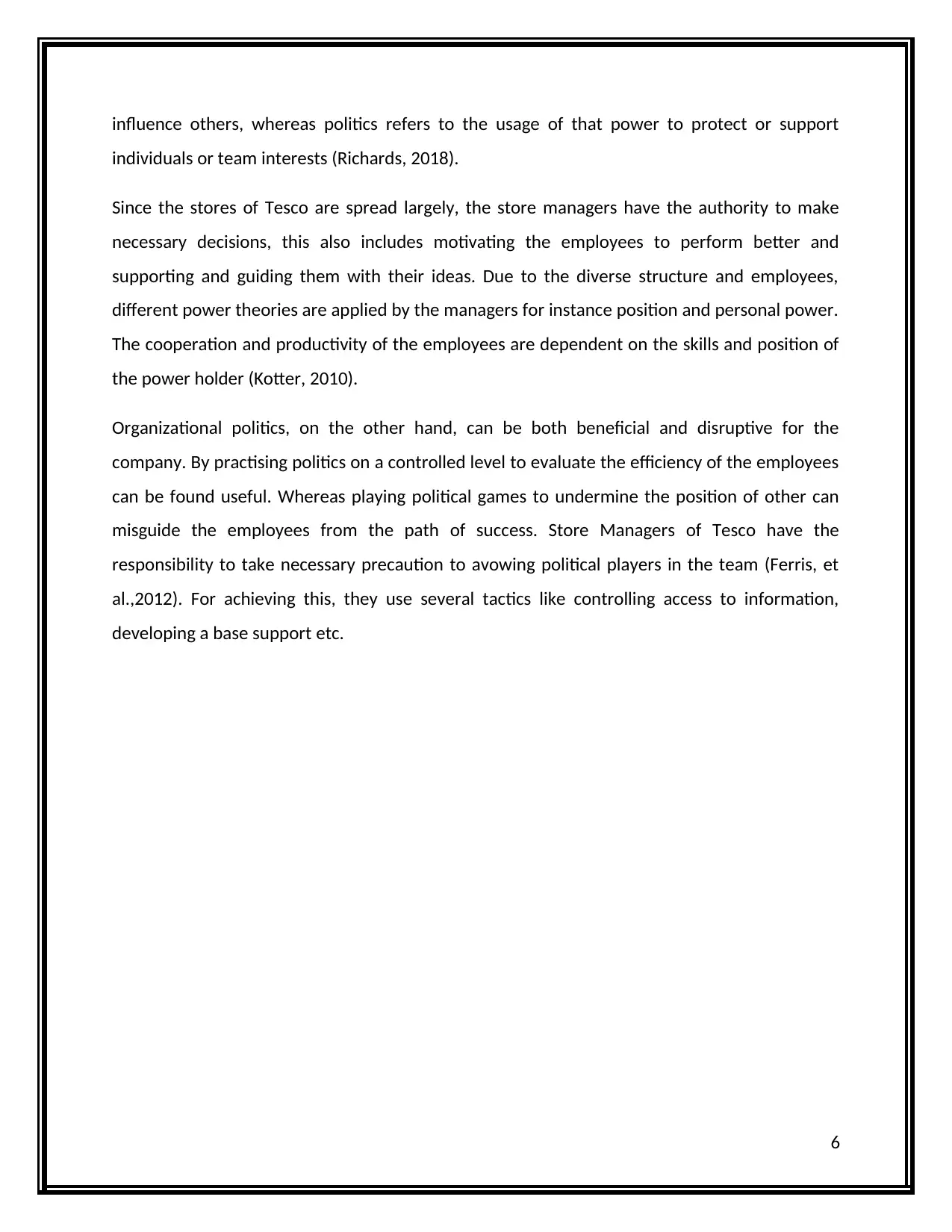
influence others, whereas politics refers to the usage of that power to protect or support
individuals or team interests (Richards, 2018).
Since the stores of Tesco are spread largely, the store managers have the authority to make
necessary decisions, this also includes motivating the employees to perform better and
supporting and guiding them with their ideas. Due to the diverse structure and employees,
different power theories are applied by the managers for instance position and personal power.
The cooperation and productivity of the employees are dependent on the skills and position of
the power holder (Kotter, 2010).
Organizational politics, on the other hand, can be both beneficial and disruptive for the
company. By practising politics on a controlled level to evaluate the efficiency of the employees
can be found useful. Whereas playing political games to undermine the position of other can
misguide the employees from the path of success. Store Managers of Tesco have the
responsibility to take necessary precaution to avowing political players in the team (Ferris, et
al.,2012). For achieving this, they use several tactics like controlling access to information,
developing a base support etc.
6
individuals or team interests (Richards, 2018).
Since the stores of Tesco are spread largely, the store managers have the authority to make
necessary decisions, this also includes motivating the employees to perform better and
supporting and guiding them with their ideas. Due to the diverse structure and employees,
different power theories are applied by the managers for instance position and personal power.
The cooperation and productivity of the employees are dependent on the skills and position of
the power holder (Kotter, 2010).
Organizational politics, on the other hand, can be both beneficial and disruptive for the
company. By practising politics on a controlled level to evaluate the efficiency of the employees
can be found useful. Whereas playing political games to undermine the position of other can
misguide the employees from the path of success. Store Managers of Tesco have the
responsibility to take necessary precaution to avowing political players in the team (Ferris, et
al.,2012). For achieving this, they use several tactics like controlling access to information,
developing a base support etc.
6
Paraphrase This Document
Need a fresh take? Get an instant paraphrase of this document with our AI Paraphraser
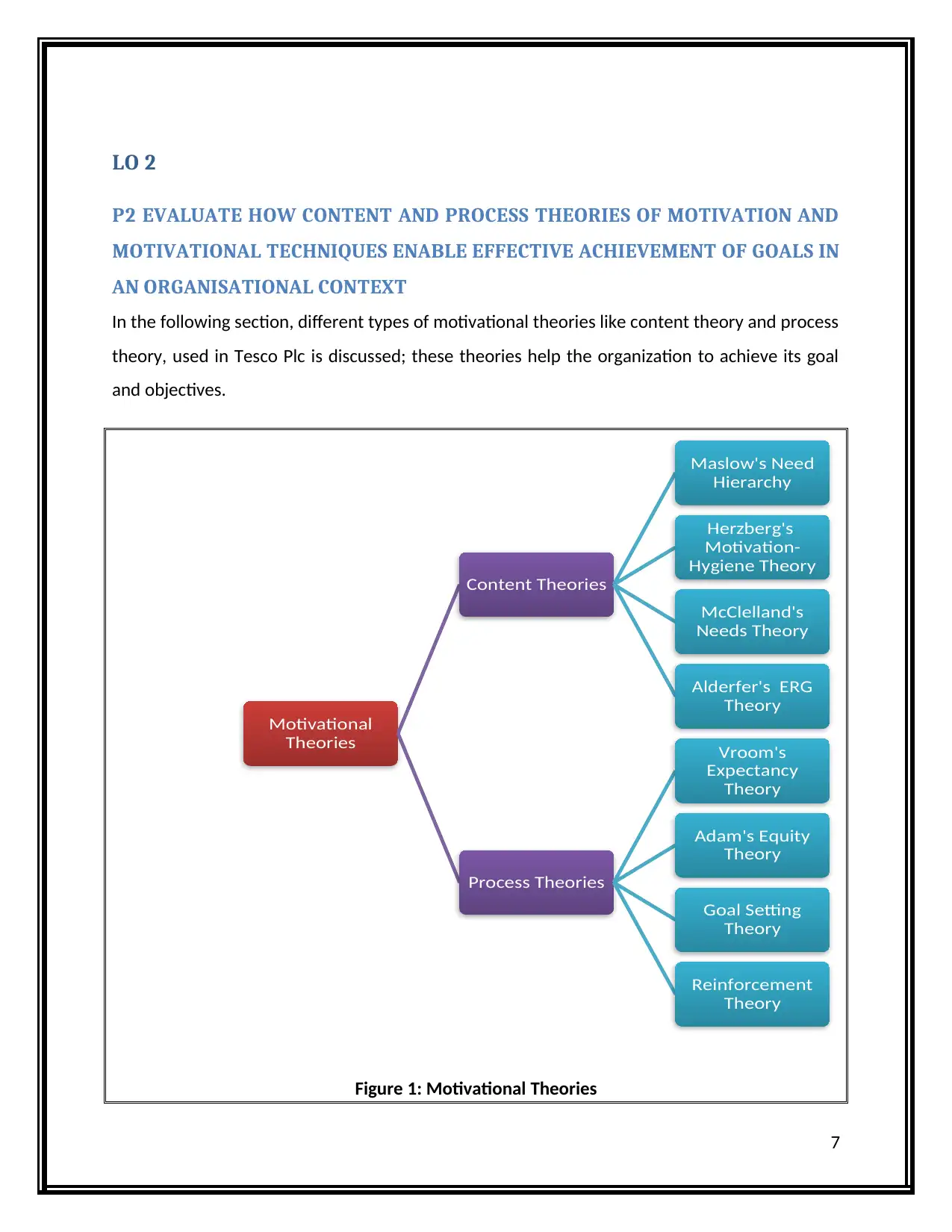
LO 2
P2 EVALUATE HOW CONTENT AND PROCESS THEORIES OF MOTIVATION AND
MOTIVATIONAL TECHNIQUES ENABLE EFFECTIVE ACHIEVEMENT OF GOALS IN
AN ORGANISATIONAL CONTEXT
In the following section, different types of motivational theories like content theory and process
theory, used in Tesco Plc is discussed; these theories help the organization to achieve its goal
and objectives.
Figure 1: Motivational Theories
7
Motivational
Theories
Content Theories
Maslow's Need
Hierarchy
Herzberg's
Motivation-
Hygiene Theory
McClelland's
Needs Theory
Alderfer's ERG
Theory
Process Theories
Vroom's
Expectancy
Theory
Adam's Equity
Theory
Goal Setting
Theory
Reinforcement
Theory
P2 EVALUATE HOW CONTENT AND PROCESS THEORIES OF MOTIVATION AND
MOTIVATIONAL TECHNIQUES ENABLE EFFECTIVE ACHIEVEMENT OF GOALS IN
AN ORGANISATIONAL CONTEXT
In the following section, different types of motivational theories like content theory and process
theory, used in Tesco Plc is discussed; these theories help the organization to achieve its goal
and objectives.
Figure 1: Motivational Theories
7
Motivational
Theories
Content Theories
Maslow's Need
Hierarchy
Herzberg's
Motivation-
Hygiene Theory
McClelland's
Needs Theory
Alderfer's ERG
Theory
Process Theories
Vroom's
Expectancy
Theory
Adam's Equity
Theory
Goal Setting
Theory
Reinforcement
Theory
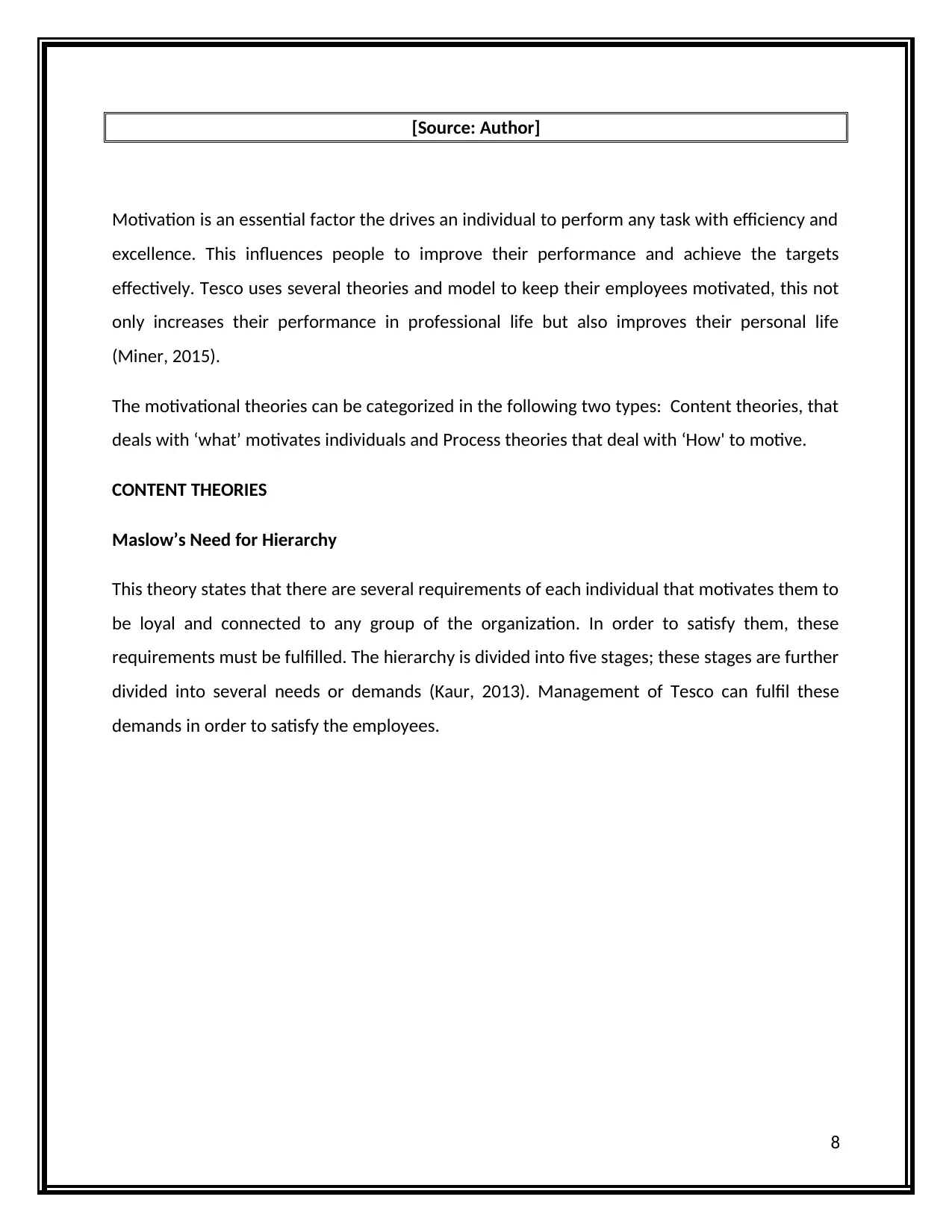
[Source: Author]
Motivation is an essential factor the drives an individual to perform any task with efficiency and
excellence. This influences people to improve their performance and achieve the targets
effectively. Tesco uses several theories and model to keep their employees motivated, this not
only increases their performance in professional life but also improves their personal life
(Miner, 2015).
The motivational theories can be categorized in the following two types: Content theories, that
deals with ‘what’ motivates individuals and Process theories that deal with ‘How' to motive.
CONTENT THEORIES
Maslow’s Need for Hierarchy
This theory states that there are several requirements of each individual that motivates them to
be loyal and connected to any group of the organization. In order to satisfy them, these
requirements must be fulfilled. The hierarchy is divided into five stages; these stages are further
divided into several needs or demands (Kaur, 2013). Management of Tesco can fulfil these
demands in order to satisfy the employees.
8
Motivation is an essential factor the drives an individual to perform any task with efficiency and
excellence. This influences people to improve their performance and achieve the targets
effectively. Tesco uses several theories and model to keep their employees motivated, this not
only increases their performance in professional life but also improves their personal life
(Miner, 2015).
The motivational theories can be categorized in the following two types: Content theories, that
deals with ‘what’ motivates individuals and Process theories that deal with ‘How' to motive.
CONTENT THEORIES
Maslow’s Need for Hierarchy
This theory states that there are several requirements of each individual that motivates them to
be loyal and connected to any group of the organization. In order to satisfy them, these
requirements must be fulfilled. The hierarchy is divided into five stages; these stages are further
divided into several needs or demands (Kaur, 2013). Management of Tesco can fulfil these
demands in order to satisfy the employees.
8
⊘ This is a preview!⊘
Do you want full access?
Subscribe today to unlock all pages.

Trusted by 1+ million students worldwide
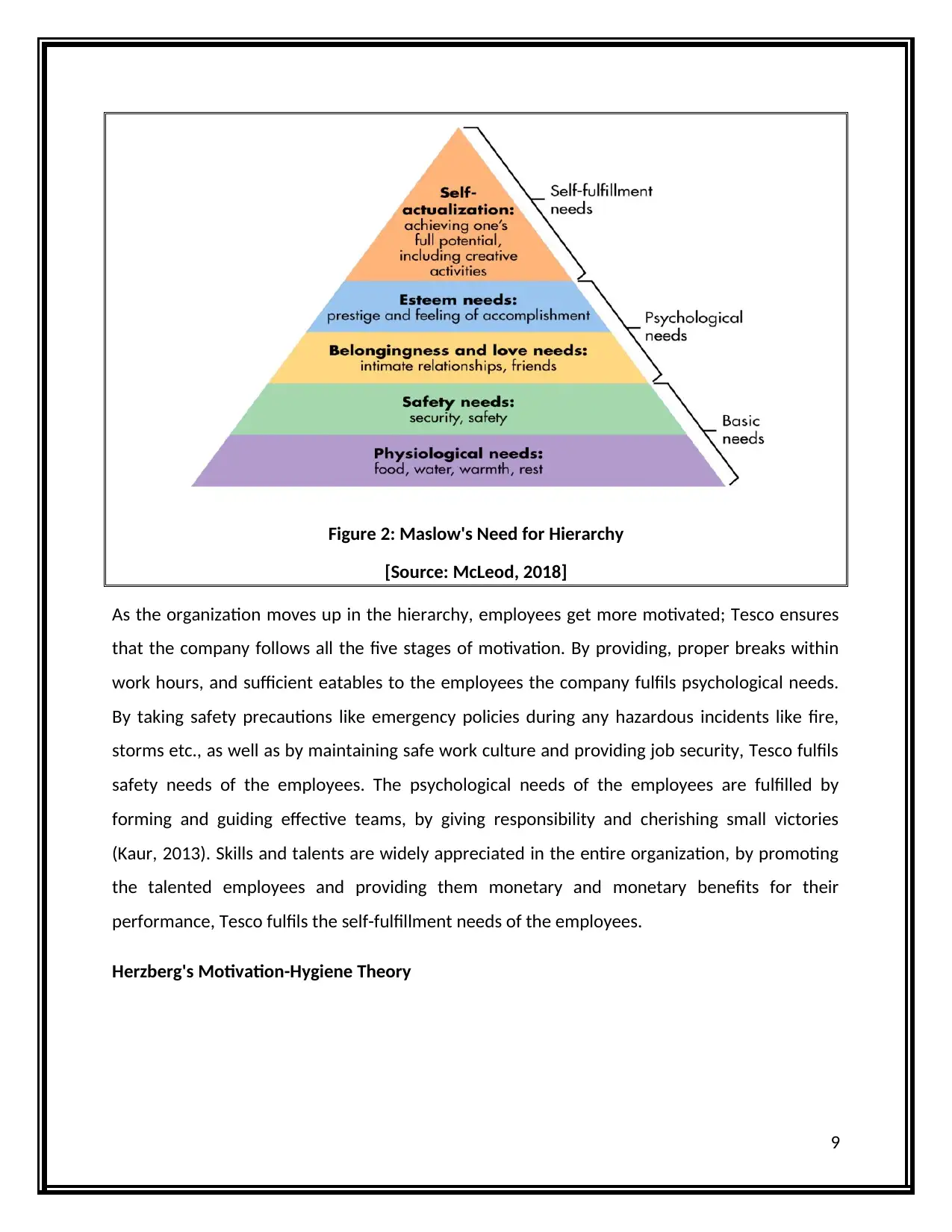
Figure 2: Maslow's Need for Hierarchy
[Source: McLeod, 2018]
As the organization moves up in the hierarchy, employees get more motivated; Tesco ensures
that the company follows all the five stages of motivation. By providing, proper breaks within
work hours, and sufficient eatables to the employees the company fulfils psychological needs.
By taking safety precautions like emergency policies during any hazardous incidents like fire,
storms etc., as well as by maintaining safe work culture and providing job security, Tesco fulfils
safety needs of the employees. The psychological needs of the employees are fulfilled by
forming and guiding effective teams, by giving responsibility and cherishing small victories
(Kaur, 2013). Skills and talents are widely appreciated in the entire organization, by promoting
the talented employees and providing them monetary and monetary benefits for their
performance, Tesco fulfils the self-fulfillment needs of the employees.
Herzberg's Motivation-Hygiene Theory
9
[Source: McLeod, 2018]
As the organization moves up in the hierarchy, employees get more motivated; Tesco ensures
that the company follows all the five stages of motivation. By providing, proper breaks within
work hours, and sufficient eatables to the employees the company fulfils psychological needs.
By taking safety precautions like emergency policies during any hazardous incidents like fire,
storms etc., as well as by maintaining safe work culture and providing job security, Tesco fulfils
safety needs of the employees. The psychological needs of the employees are fulfilled by
forming and guiding effective teams, by giving responsibility and cherishing small victories
(Kaur, 2013). Skills and talents are widely appreciated in the entire organization, by promoting
the talented employees and providing them monetary and monetary benefits for their
performance, Tesco fulfils the self-fulfillment needs of the employees.
Herzberg's Motivation-Hygiene Theory
9
Paraphrase This Document
Need a fresh take? Get an instant paraphrase of this document with our AI Paraphraser
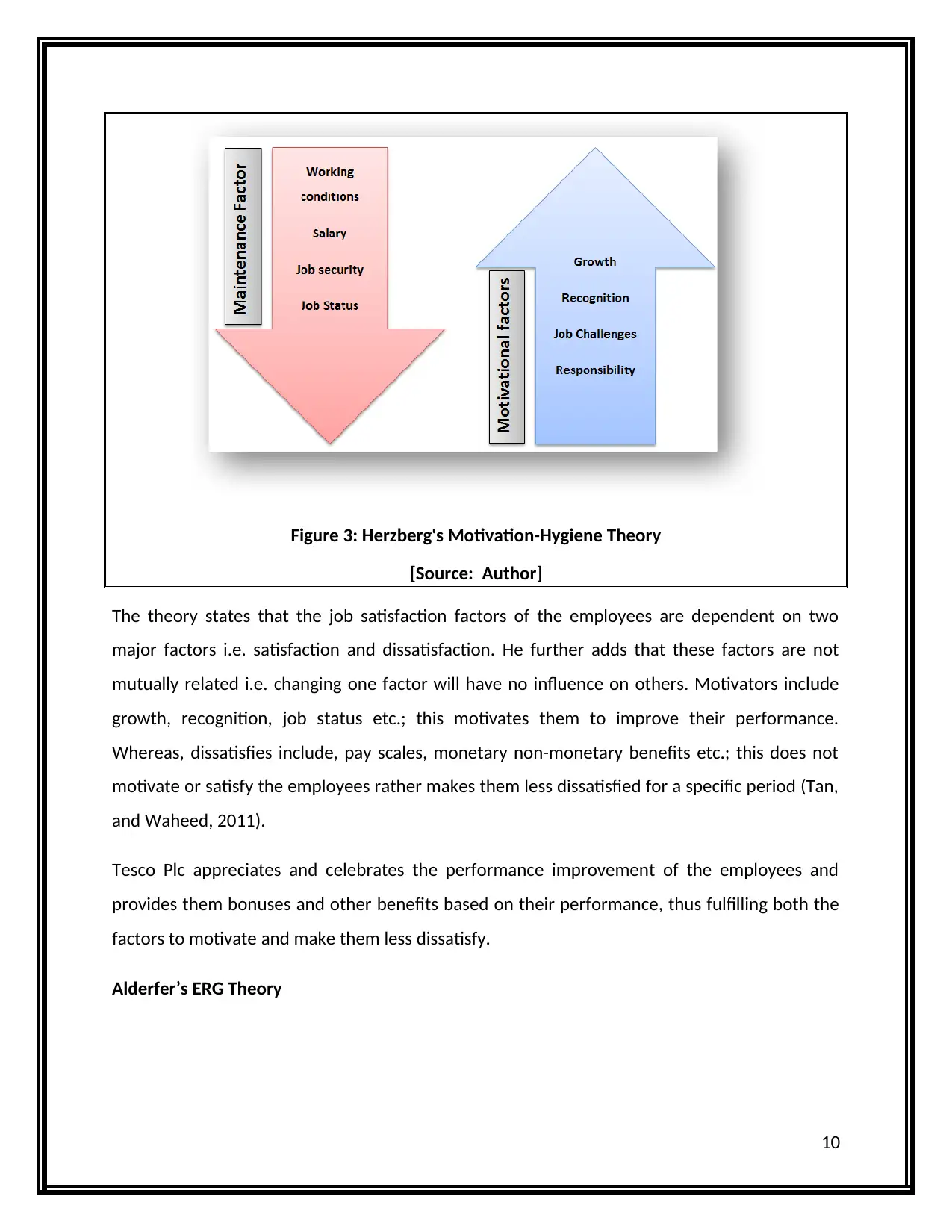
Figure 3: Herzberg's Motivation-Hygiene Theory
[Source: Author]
The theory states that the job satisfaction factors of the employees are dependent on two
major factors i.e. satisfaction and dissatisfaction. He further adds that these factors are not
mutually related i.e. changing one factor will have no influence on others. Motivators include
growth, recognition, job status etc.; this motivates them to improve their performance.
Whereas, dissatisfies include, pay scales, monetary non-monetary benefits etc.; this does not
motivate or satisfy the employees rather makes them less dissatisfied for a specific period (Tan,
and Waheed, 2011).
Tesco Plc appreciates and celebrates the performance improvement of the employees and
provides them bonuses and other benefits based on their performance, thus fulfilling both the
factors to motivate and make them less dissatisfy.
Alderfer’s ERG Theory
10
[Source: Author]
The theory states that the job satisfaction factors of the employees are dependent on two
major factors i.e. satisfaction and dissatisfaction. He further adds that these factors are not
mutually related i.e. changing one factor will have no influence on others. Motivators include
growth, recognition, job status etc.; this motivates them to improve their performance.
Whereas, dissatisfies include, pay scales, monetary non-monetary benefits etc.; this does not
motivate or satisfy the employees rather makes them less dissatisfied for a specific period (Tan,
and Waheed, 2011).
Tesco Plc appreciates and celebrates the performance improvement of the employees and
provides them bonuses and other benefits based on their performance, thus fulfilling both the
factors to motivate and make them less dissatisfy.
Alderfer’s ERG Theory
10
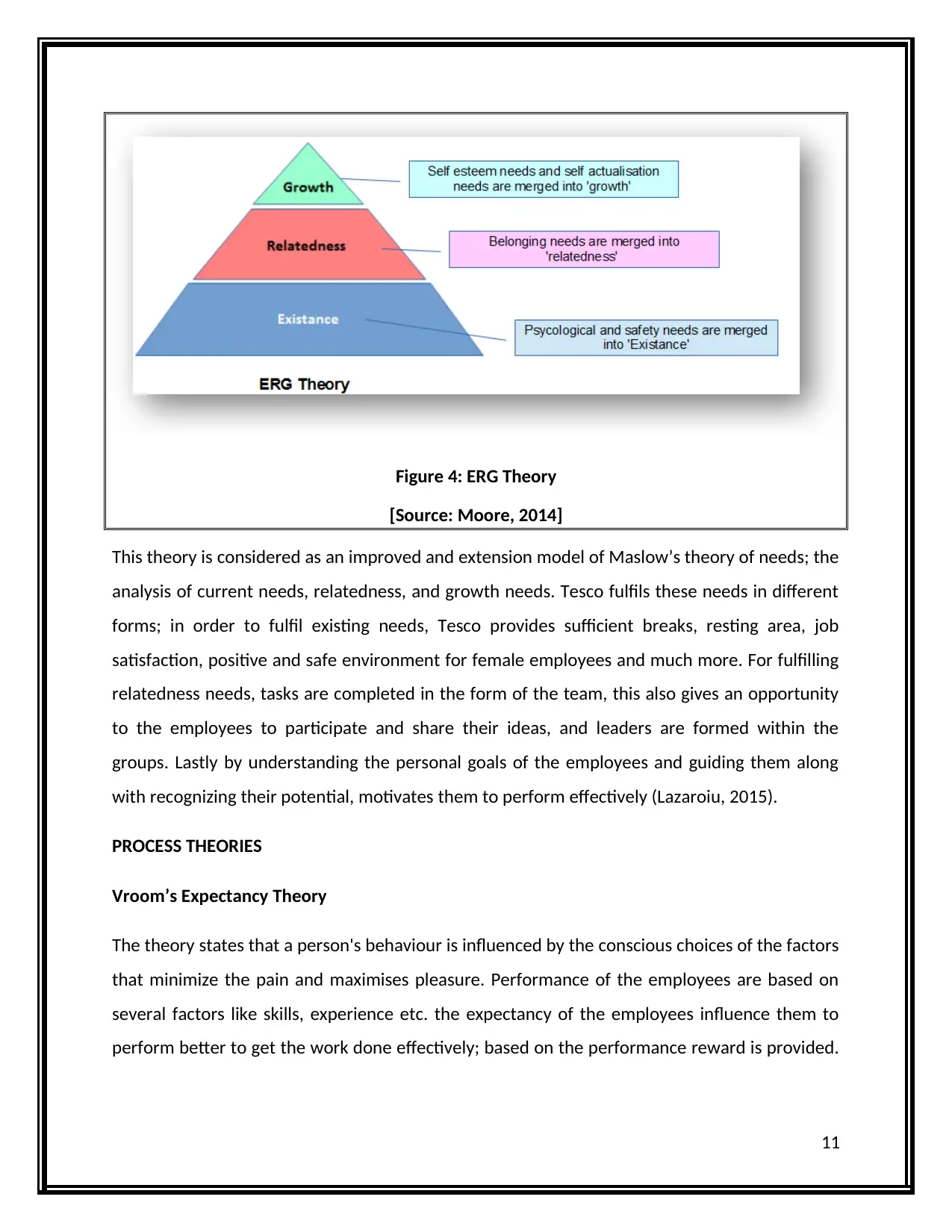
Figure 4: ERG Theory
[Source: Moore, 2014]
This theory is considered as an improved and extension model of Maslow’s theory of needs; the
analysis of current needs, relatedness, and growth needs. Tesco fulfils these needs in different
forms; in order to fulfil existing needs, Tesco provides sufficient breaks, resting area, job
satisfaction, positive and safe environment for female employees and much more. For fulfilling
relatedness needs, tasks are completed in the form of the team, this also gives an opportunity
to the employees to participate and share their ideas, and leaders are formed within the
groups. Lastly by understanding the personal goals of the employees and guiding them along
with recognizing their potential, motivates them to perform effectively (Lazaroiu, 2015).
PROCESS THEORIES
Vroom’s Expectancy Theory
The theory states that a person's behaviour is influenced by the conscious choices of the factors
that minimize the pain and maximises pleasure. Performance of the employees are based on
several factors like skills, experience etc. the expectancy of the employees influence them to
perform better to get the work done effectively; based on the performance reward is provided.
11
[Source: Moore, 2014]
This theory is considered as an improved and extension model of Maslow’s theory of needs; the
analysis of current needs, relatedness, and growth needs. Tesco fulfils these needs in different
forms; in order to fulfil existing needs, Tesco provides sufficient breaks, resting area, job
satisfaction, positive and safe environment for female employees and much more. For fulfilling
relatedness needs, tasks are completed in the form of the team, this also gives an opportunity
to the employees to participate and share their ideas, and leaders are formed within the
groups. Lastly by understanding the personal goals of the employees and guiding them along
with recognizing their potential, motivates them to perform effectively (Lazaroiu, 2015).
PROCESS THEORIES
Vroom’s Expectancy Theory
The theory states that a person's behaviour is influenced by the conscious choices of the factors
that minimize the pain and maximises pleasure. Performance of the employees are based on
several factors like skills, experience etc. the expectancy of the employees influence them to
perform better to get the work done effectively; based on the performance reward is provided.
11
⊘ This is a preview!⊘
Do you want full access?
Subscribe today to unlock all pages.

Trusted by 1+ million students worldwide
1 out of 28
Related Documents
Your All-in-One AI-Powered Toolkit for Academic Success.
+13062052269
info@desklib.com
Available 24*7 on WhatsApp / Email
![[object Object]](/_next/static/media/star-bottom.7253800d.svg)
Unlock your academic potential
Copyright © 2020–2026 A2Z Services. All Rights Reserved. Developed and managed by ZUCOL.




